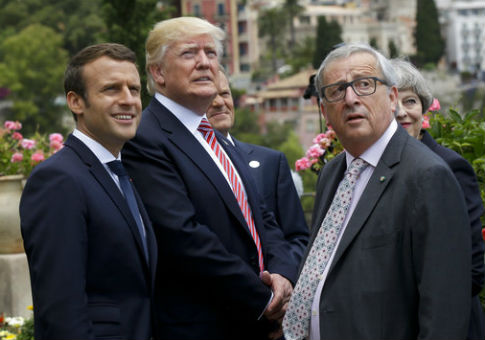Jean-Claude Juncker, president of the European Commission, appeared to confirm Friday that President Donald Trump had complained privately about Germany, but he pushed back against the notion that Trump was aggressive in his criticism.
Juncker instead described a "very frankly constructed meeting" with Trump in Brussels and said that it was not "aggressive" like news outlets had reported, according to Politico.
Juncker's intervention, at a press conference ahead of Friday's meeting of G7 leaders in Taormina, Sicily, came after reports in the German press, sourced to someone in the room, claimed that Trump had complained about the "terrible" trade deficit between the U.S. and Germany.
At the press conference Friday, European Council President Donald Tusk refused to comment and hit out at the leaks. "I don't want to be a part of this culture of permanent leaks. Today's diplomacy needs professional plumbers, not indiscreet diplomats," he said.
Juncker, however, was less reticent.
"I don't want to comment but I have to comment," he said, drawing laughter. "We had a meeting with President Trump, which was a very frankly constructed meeting."
"It's not true that the president took an aggressive approach when it came to the German trade surplus," he continued. "This is a real translation [issue]. If someone is saying the Germans are bad that doesn't mean this can be translated literally. He was not aggressive at all."
Juncker told Trump that he should be comparing the U.S. economy's trade balance with the European Union as a whole, not just with Germany.
"Without taking the defense of the Germans, I was making clear the U.S. cannot compare their trade situation with individual members states of the European Union," he said. "They have to compare their performance with the global performance of the European Union, and I made it clear that the commission is in charge of dealing with trade issues, not the member states."
This is not the first time that Trump has raised concerns about U.S.-German trade. He threatened to impose a 35 percent tax on Germany's auto imports earlier in the year.
"If you want to build cars in the world, then I wish you all the best. You can build cars for the United States, but for every car that comes to the U.S., you will pay 35 percent tax," Trump told Germany's Bild newspaper at the time. "I would tell BMW that if you are building a factory in Mexico and plan to sell cars to the U.S., without a 35 percent tax, then you can forget that."
Global trade rules, climate change, and migration were key issues of division that overshadowed the start of the G7 talks, Politico reported.
Tusk said the primary goal of the talks was keeping the Group of Seven economies united, admitting that it was "the most challenging G7 in years" because of the stark differences of opinion between Trump and the rest. Juncker took an early pot shot at Trump by saying they wanted to "build bridges, not walls."
However, Trump and the EU were able to find unity on the international response to terrorism and the conflict in Ukraine.
Tusk said that he agreed with Trump that there needed to be a forceful response to terrorist attacks, such as the suicide bombing in Manchester on Monday, which killed 22 people at a pop concert.
He said that he agreed with the U.S. president that the West needed to be "tough, even brutal" when it came to fighting ISIS.
